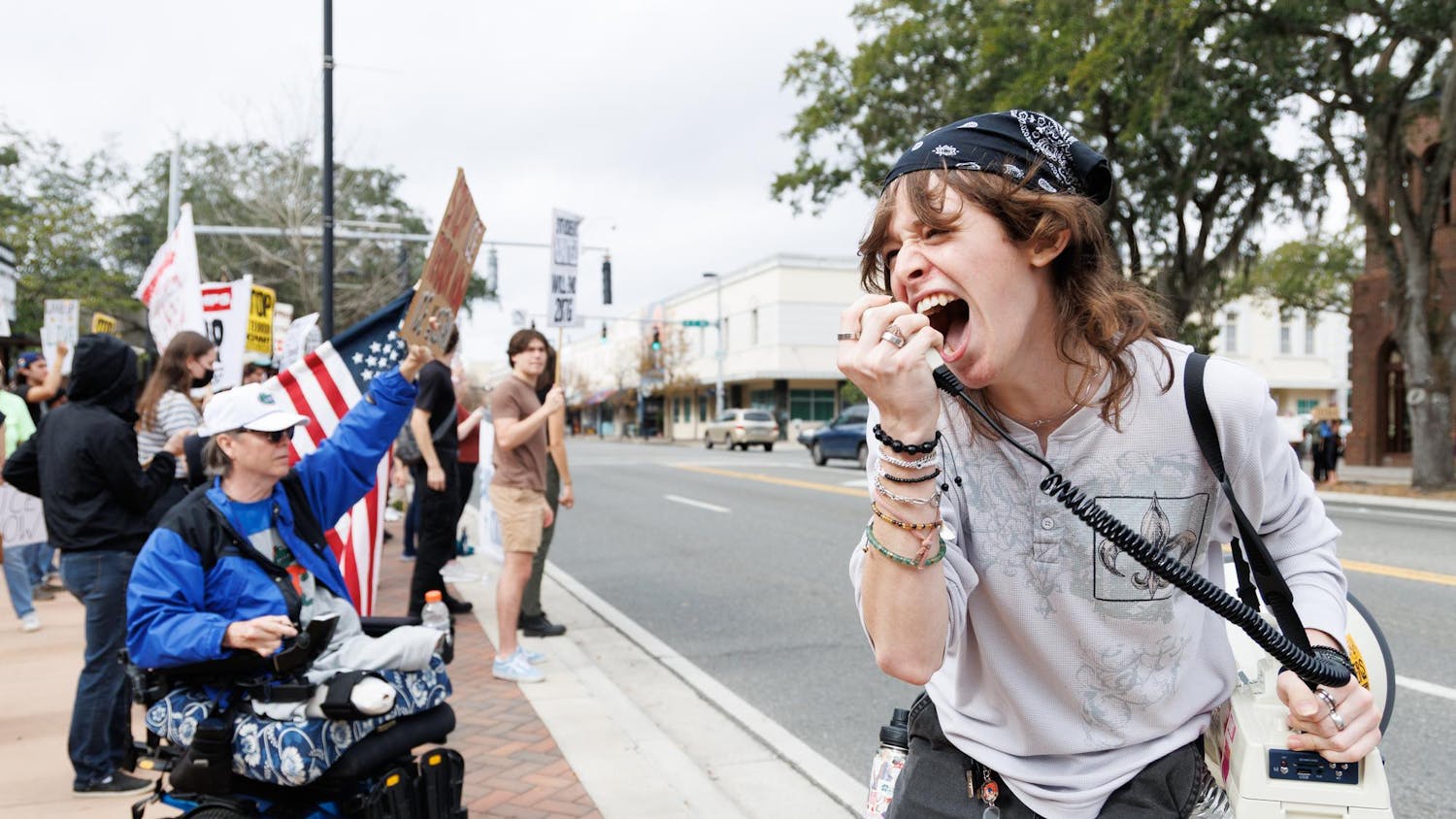A Shands psychiatric patient was cornered by staff, shocked by force and left with lasting memory damage.
In early June, Henley attempted to leave his assisted living facility. After being in the emergency room for a shoulder fracture, he was forced into UF Health Shands Psychiatric Hospital. There, he told staff he had a heart condition that could make electroshock deadly.
Henley was cornered by about 20 staff members and forced into shock therapy for weeks, said Michele Diamond, Henley’s Shield Campaign Manager for MindFreedom International, a nonprofit advocating for people with mental health disorders. Henley said he was forced to undergo 12 shock procedures. Diamond said she talked with Henley by phone while he was at Shands and has spoken with him since his release.
Electroconvulsive therapy uses an electric current to the head to treat mood disorders, like depression and bipolar disorder. The current causes a seizure in the brain, which doctors believe helps it rewire itself, helping relieve symptoms of mood disorders.
ECT is legal in the U.S. and is generally safe and effective, according to UF Health. In some cases, with courts’ permission, doctors can force very sick patients to get the treatment.
The therapy’s response rate is high, even when prior medication and therapy trials have failed, according to UF Health. It’s also used for mania, catalonia and psychosis when individuals don’t improve with other treatments. Many tolerate ECT better than medications, according to UF Health.
But that wasn’t the case for Henley, a Shands Psychiatric Hospital patient. He had been living in an assisted living facility near Orlando for years after trying to harm himself. When he attempted to escape, he was forced into the hospital,
UF Health did not comment on Henley’s case, citing patient privacy laws.
Despite heart complications being a side effect of ECT, Henley was forced into the therapy after telling doctors he was at risk for heart problems, Diamond said.
“He was very fearful,” Diamond said. “I just prayed for him during these treatments.”
After shock, Henley began forgetting things, mixing up his words and repeating himself, according to MindFreedom International. Despite nerve pain and shaking legs, staff didn’t help, Diamond said.
Diamond believes Henley was admitted to Shands the week of June 6, and said he received shock three days per week until being discharged July 20. Diamond estimates he was in the hospital for about six to seven weeks.
But shock’s effects lingered long after Henley’s discharge, Diamond said, causing depression.
“He couldn’t even walk out of the assisted living up to the store, he said I’ll get lost,” Diamond said.
Henley refused to comment further but agreed to let Diamond represent him.
With risks as severe as death, Diamond said electroshock should be banned and replaced with more humane treatments, like Cognitive Behavioral Therapy.
“That’s what most people need, is just to talk to somebody non-judgmentally, without having the fear of being locked away for how they feel,” Diamond said.
While anesthesia can impair memory, the effect is variable and can be decreased with unilateral ECT, Elias Sarkis, medical director of Sarkis Family Psychiatry and Clinical Trials, wrote in an email.
“ECT is associated with lifesaving improvement in patients,” Sarkis wrote.
UF Health offers ECT to hospitalized patients and outpatients. Its website provides more information. UF Health declined to comment on ECT for this story.
Ron Bassman, executive director of MindFreedom International, said he was forced into shock therapy in 1969, when he was 25. He lost his memory for about a year and a half and believes shock hindered his creativity.
Bassman’s experience pushed him to help others as a psychologist. His success the past 40 years has led others who’ve undergone shock to come see him, asking if their memory would return.
“It’s unpredictable,” Bassman said. “There’s usually some fragments that don’t come back.”
For the past year and a half, Bassman said he has worked with a woman who had 99 electroshock treatments and lost her memory. But her doctor said the memory loss was from depression. Despite rationalizations about side effects, studies reveal the damage shock does, Bassman said.
“It’s probably a mystery why I was able to go on,” Bassman said.
While some have said their lives were saved with electroshock, Bassman hypothesized it’s a small proportion of patients.
While Bassman said people should be free to choose their treatment, forced shocking should be banned. But he said there isn’t true informed consent, because doctors don’t tell patients the irreparable damage shock does.
“This is pretty much an ongoing fight to inform the public,” Bassman said.
Most people not forced to undergo electroshock were angry they weren’t told the truth about it, Jim Gottstein, an attorney and founder of PsychRights, said. Shock causes permanent memory loss and closed head injury.
Gottstein also said electroshock doesn’t treat mood disorders. It may work for a day or two because of the euphoria from a head injury, but once effects wear off, doctors have to keep performing it, causing progressive brain damage and memory loss.
“Electroshock is as barbaric as it seems,” Gottstein said.
Contact J.P. Oprison at joprison@alligator.org. Follow him on Twitter @JOprison.

JP is a fourth-year journalism major with a minor in history. He is currently the health reporter for The Alligator, focusing on how the pandemic is affecting Alachua County and the thousands of students in Gainesville. In his free time, JP likes to exercise at the gym and relax on the beach.






